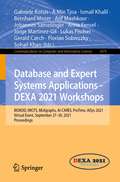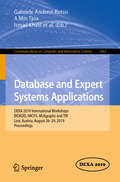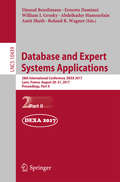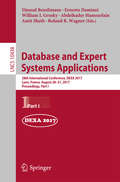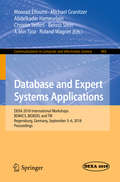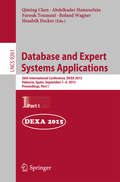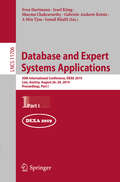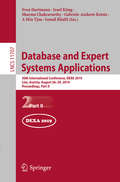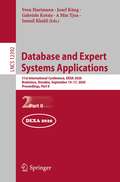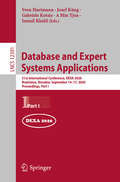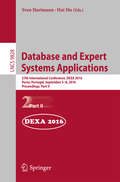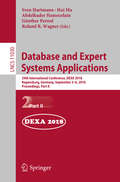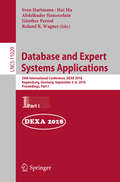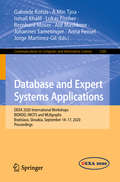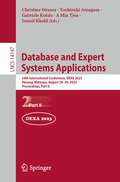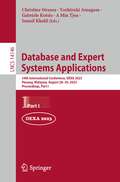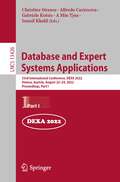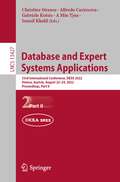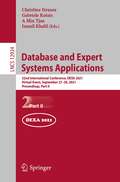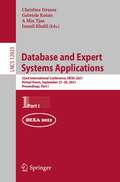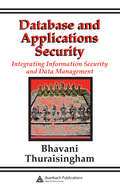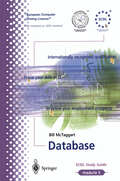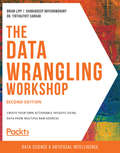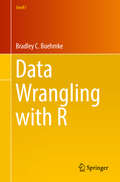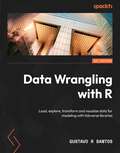- Table View
- List View
Database and Expert Systems Applications - DEXA 2021 Workshops: BIOKDD, IWCFS, MLKgraphs, AI-CARES, ProTime, AISys 2021, Virtual Event, September 27–30, 2021, Proceedings (Communications in Computer and Information Science #1479)
by Ismail Khalil A Min Tjoa Atif Mashkoor Anna Fensel Johannes Sametinger Bernhard Moser Jorge Martinez-Gil Gabriele Kotsis Lukas Fischer Sohail Khan Gerald Czech Florian SobieczkyThis volume constitutes the refereed proceedings of the workshops held at the 32nd International Conference on Database and Expert Systems Applications, DEXA 2021, held in a virtual format in September 2021: The 12th International Workshop on Biological Knowledge Discovery from Data (BIOKDD 2021), the 5th International Workshop on Cyber-Security and Functional Safety in Cyber-Physical Systems (IWCFS 2021), the 3rd International Workshop on Machine Learning and Knowledge Graphs (MLKgraphs 2021), the 1st International Workshop on Artificial Intelligence for Clean, Affordable and Reliable Energy Supply (AI-CARES 2021), the 1st International Workshop on Time Ordered Data (ProTime2021), and the 1st International Workshop on AI System Engineering: Math, Modelling and Software (AISys2021). Due to the COVID-19 pandemic the conference and workshops were held virtually. The 23 papers were thoroughly reviewed and selected from 50 submissions, and discuss a range of topics including: knowledge discovery, biological data, cyber security, cyber-physical system, machine learning, knowledge graphs, information retriever, data base, and artificial intelligence.
Database and Expert Systems Applications: DEXA 2019 International Workshops BIOKDD, IWCFS, MLKgraphs and TIR, Linz, Austria, August 26–29, 2019, Proceedings (Communications in Computer and Information Science #1062)
by Gabriele Anderst-Kotsis A Min Tjoa Ismail Khalil Mourad Elloumi Atif Mashkoor Johannes Sametinger Xabier Larrucea Anna Fensel Jorge Martinez-Gil Bernhard Moser Christin Seifert Benno Stein Michael GranitzerThis volume constitutes the refereed proceedings of the four workshops held at the 30th International Conference on Database and Expert Systems Applications, DEXA 2019, held in Linz, Austria, in August 2019: The 10th International Workshop on Biological Knowledge Discovery from Data, BIOKDD 2019, the 3rd International Workshop on Cyber-Security and Functional Safety in Cyber-Physical Systems, IWCFS 2019, the 1st International Workshop on Machine Learning and Knowledge Graphs, MLKgraphs2019, and the 16th International Workshop on Technologies for Information Retrieval, TIR 2019. The 26 selected papers discuss a range of topics including: knowledge discovery, biological data, cyber security, cyber-physical system, machine learning, knowledge graphs, information retriever, data base, and artificial intelligent.
Database and Expert Systems Applications: 28th International Conference, DEXA 2017, Lyon, France, August 28-31, 2017, Proceedings, Part II (Lecture Notes in Computer Science #10439)
by Djamal Benslimane, Ernesto Damiani, William I. Grosky, Abdelkader Hameurlain, Amit Sheth and Roland R. WagnerThis two volume set LNCS 10438 and LNCS 10439 constitutes the refereed proceedings of the 28th International Conference on Database and Expert Systems Applications, DEXA 2017, held in Lyon, France, August 2017. The 37 revised full papers presented together with 40 short papers were carefully reviewed and selected from 166 submissions. The papers discuss a range of topics including: Semantic Web and Semantics; Graph Matching; Data Modeling, Data Abstraction, and Uncertainty; Preferences and Query Optimization; Data Integration and RDF Matching; Security and Privacy; Web Search; Data Clustering; Top-K and Skyline Queries; Data Mining and Big Data; Service Computing; Continuous and Temporal Data, and Continuous Query Language; Text Processing and Semantic Search; Indexing and Concurrency Control Methods; Data Warehouse and Data Stream Warehouse; Data Mining and Machine Learning; Recommender Systems and Query Recommendation; Graph Algorithms; Semantic Clustering and Data Classification.
Database and Expert Systems Applications: 28th International Conference, DEXA 2017, Lyon, France, August 28-31, 2017, Proceedings, Part I (Lecture Notes in Computer Science #10438)
by Djamal Benslimane, Ernesto Damiani, William I. Grosky, Abdelkader Hameurlain, Amit Sheth and Roland R. WagnerThis two volume set LNCS 10438 and LNCS 10439 constitutes the refereed proceedings of the 28th International Conference on Database and Expert Systems Applications, DEXA 2017, held in Lyon, France, August 2017. The 37 revised full papers presented together with 40 short papers were carefully reviewed and selected from 166 submissions. The papers discuss a range of topics including: Semantic Web and Semantics; Graph Matching; Data Modeling, Data Abstraction, and Uncertainty; Preferences and Query Optimization; Data Integration and RDF Matching; Security and Privacy; Web Search; Data Clustering; Top-K and Skyline Queries; Data Mining and Big Data; Service Computing; Continuous and Temporal Data, and Continuous Query Language; Text Processing and Semantic Search; Indexing and Concurrency Control Methods; Data Warehouse and Data Stream Warehouse; Data Mining and Machine Learning; Recommender Systems and Query Recommendation; Graph Algorithms; Semantic Clustering and Data Classification.
Database and Expert Systems Applications: DEXA 2018 International Workshops, BDMICS, BIOKDD, and TIR, Regensburg, Germany, September 3–6, 2018, Proceedings (Communications in Computer and Information Science #903)
by Mourad Elloumi Michael Granitzer Abdelkader Hameurlain Christin Seifert Benno Stein A Min Tjoa Roland WagnerThis volume constitutes the refereed proceedings of the three workshops held at the 29th International Conference on Database and Expert Systems Applications, DEXA 2018, held in Regensburg, Germany, in September 2018: the Third International Workshop on Big Data Management in Cloud Systems, BDMICS 2018, the 9th International Workshop on Biological Knowledge Discovery from Data, BIOKDD, and the 15th International Workshop on Technologies for Information Retrieval, TIR.The 25 revised full papers were carefully reviewed and selected from 33 submissions. The papers discuss a range of topics including: parallel data management systems, consistency and privacy cloud computing and graph queries, web and domain corpora, NLP applications, social media and personalization
Database and Expert Systems Applications: 26th International Conference, DEXA 2015, Valencia, Spain, September 1-4, 2015, Proceedings, Part I (Lecture Notes in Computer Science #9261)
by Abdelkader Hameurlain Roland Wagner Hendrik Decker Farouk Toumani Qiming ChenThis two volume set LNCS 9261 and LNCS 9262 constitutes the refereed proceedings of the 26th International Conference on Database and Expert Systems Applications, DEXA 2015, held in Valencia, Spain, September 1-4, 2015. The 40 revised full papers presented together with 32 short papers, and 2 keynote talks, were carefully reviewed and selected from 125 submissions. The papers discuss a range of topics including: temporal, spatial and high dimensional databases; semantic Web and ontologies; modeling, linked open data; NoSQLm NewSQL, data integration; uncertain data and inconsistency tolerance; database system architecture; data mining, query processing and optimization; indexing and decision support systems; modeling, extraction, social networks; knowledge management and consistency; mobility, privacy and security; data streams, Web services; distributed, parallel and cloud databases; information retrieval; XML and semi-structured data; data partitioning, indexing; data mining, applications; WWW and databases; data management algorithms. These volumes also include accepted papers of the 8th International Conference on Data Management in Cloud, Grid and P2P Systems, Globe 2015, held in Valencia, Spain, September 2, 2015. The 8 full papers presented were carefully reviewed and selected from 13 submissions. The papers discuss a range of topics including: MapReduce framework: load balancing, optimization and classification; security, data privacy and consistency; query rewriting and streaming.
Database and Expert Systems Applications: 30th International Conference, DEXA 2019, Linz, Austria, August 26–29, 2019, Proceedings, Part I (Lecture Notes in Computer Science #11706)
by Sven Hartmann Josef Küng Sharma Chakravarthy Gabriele Anderst-Kotsis A Min Tjoa Ismail KhalilThis two volume set of LNCS 11706 and LNCS 11707 constitutes the refereed proceedings of the 30th International Conference on Database and Expert Systems Applications, DEXA 2019, held in Linz, Austria, in August 2019. The 32 full papers presented together with 34 short papers were carefully reviewed and selected from 157 submissions. The papers are organized in the following topical sections: Part I: Big data management and analytics; data structures and data management; management and processing of knowledge; authenticity, privacy, security and trust; consistency, integrity, quality of data; decision support systems; data mining and warehousing. Part II: Distributed, parallel, P2P, grid and cloud databases; information retrieval; Semantic Web and ontologies; information processing; temporal, spatial, and high dimensional databases; knowledge discovery; web services.
Database and Expert Systems Applications: 30th International Conference, DEXA 2019, Linz, Austria, August 26–29, 2019, Proceedings, Part II (Lecture Notes in Computer Science #11707)
by Sven Hartmann Josef Küng Sharma Chakravarthy Gabriele Anderst-Kotsis A Min Tjoa Ismail KhalilThis two volume set of LNCS 11706 and LNCS 11707 constitutes the refereed proceedings of the 30th International Conference on Database and Expert Systems Applications, DEXA 2019, held in Linz, Austria, in August 2019.The 32 full papers presented together with 34 short papers were carefully reviewed and selected from 157 submissions. The papers are organized in the following topical sections: Part I: Big data management and analytics; data structures and data management; management and processing of knowledge; authenticity, privacy, security and trust; consistency, integrity, quality of data; decision support systems; data mining and warehousing. Part II: Distributed, parallel, P2P, grid and cloud databases; information retrieval; Semantic Web and ontologies; information processing; temporal, spatial, and high dimensional databases; knowledge discovery; web services.
Database and Expert Systems Applications: 31st International Conference, DEXA 2020, Bratislava, Slovakia, September 14–17, 2020, Proceedings, Part II (Lecture Notes in Computer Science #12392)
by Sven Hartmann Josef Küng Gabriele Kotsis A Min Tjoa Ismail KhalilThe double volumes LNCS 12391-12392 constitutes the papers of the 31st International Conference on Database and Expert Systems Applications, DEXA 2020, which will be held online in September 2020. The 38 full papers presented together with 20 short papers plus 1 keynote papers in these volumes were carefully reviewed and selected from a total of 190 submissions.
Database and Expert Systems Applications: 31st International Conference, DEXA 2020, Bratislava, Slovakia, September 14–17, 2020, Proceedings, Part I (Lecture Notes in Computer Science #12391)
by Sven Hartmann Josef Küng Gabriele Kotsis A Min Tjoa Ismail KhalilThe double volumes LNCS 12391-12392 constitutes the papers of the 31st International Conference on Database and Expert Systems Applications, DEXA 2020, which will be held online in September 2020. The 38 full papers presented together with 20 short papers plus 1 keynote papers in these volumes were carefully reviewed and selected from a total of 190 submissions.
Database and Expert Systems Applications: 27th International Conference, DEXA 2016, Porto, Portugal, September 5-8, 2016, Proceedings, Part II (Lecture Notes in Computer Science #9828)
by Sven Hartmann Hui MaThis two volume set LNCS 9827 and LNCS 9828 constitutes the refereed proceedings of the 27th International Conference on Database and Expert Systems Applications, DEXA 2016, held in Porto, Portugal, September 2016. The 39 revised full papers presented together with 29 short papers were carefully reviewed and selected from 137 submissions. The papers discuss a range of topics including: Temporal, Spatial, and High Dimensional Databases; Data Mining; Authenticity, Privacy, Security, and Trust; Data Clustering; Distributed and Big Data Processing; Decision Support Systems, and Learning; Data Streams; Data Integration, and Interoperability; Semantic Web, and Data Semantics; Social Networks, and Network Analysis; Linked Data; Data Analysis; NoSQL, NewSQL; Multimedia Data; Personal Information Management; Semantic Web and Ontologies; Database and Information System Architectures; Query Answering and Optimization; Information Retrieval, and Keyword Search; Data Modelling, and Uncertainty.
Database and Expert Systems Applications: 29th International Conference, DEXA 2018, Regensburg, Germany, September 3–6, 2018, Proceedings, Part II (Lecture Notes in Computer Science #11030)
by Sven Hartmann Hui Ma Abdelkader Hameurlain Günther Pernul Roland R. WagnerThis two volume set of LNCS 11029 and LNCS 11030 constitutes the refereed proceedings of the 29th International Conference on Database and Expert Systems Applications, DEXA 2018, held in Regensburg, Germany, in September 2018.The 35 revised full papers presented together with 40 short papers were carefully reviewed and selected from 160 submissions. The papers of the first volume discuss a range of topics including: Big data analytics; data integrity and privacy; decision support systems; data semantics; cloud data processing; time series data; social networks; temporal and spatial databases; and graph data and road networks. The papers of the second volume discuss a range of the following topics: Information retrieval; uncertain information; data warehouses and recommender systems; data streams; information networks and algorithms; database system architecture and performance; novel database solutions; graph querying and databases; learning; emerging applications; data mining; privacy; and text processing.
Database and Expert Systems Applications: 29th International Conference, DEXA 2018, Regensburg, Germany, September 3–6, 2018, Proceedings, Part I (Lecture Notes in Computer Science #11029)
by Sven Hartmann Hui Ma Abdelkader Hameurlain Günther Pernul Roland R. WagnerThis two volume set of LNCS 11029 and LNCS 11030 constitutes the refereed proceedings of the 29th International Conference on Database and Expert Systems Applications, DEXA 2018, held in Regensburg, Germany, in September 2018. The 35 revised full papers presented together with 40 short papers were carefully reviewed and selected from 160 submissions. The papers of the first volume discuss a range of topics including: Big data analytics; data integrity and privacy; decision support systems; data semantics; cloud data processing; time series data; social networks; temporal and spatial databases; and graph data and road networks. The papers of the second volume discuss a range of the following topics: Information retrieval; uncertain information; data warehouses and recommender systems; data streams; information networks and algorithms; database system architecture and performance; novel database solutions; graph querying and databases; learning; emerging applications; data mining; privacy; and text processing.
Database and Expert Systems Applications: DEXA 2020 International Workshops BIOKDD, IWCFS and MLKgraphs, Bratislava, Slovakia, September 14–17, 2020, Proceedings (Communications in Computer and Information Science #1285)
by Gabriele Kotsis A Min Tjoa Ismail Khalil Lukas Fischer Bernhard Moser Atif Mashkoor Johannes Sametinger Anna Fensel Jorge Martinez-GilThis volume constitutes the refereed proceedings of the three workshops held at the 31st International Conference on Database and Expert Systems Applications, DEXA 2020, held in September 2020: The 11th International Workshop on Biological Knowledge Discovery from Data, BIOKDD 2020, the 4th International Workshop on Cyber-Security and Functional Safety in Cyber-Physical Systems, IWCFS 2020, the 2nd International Workshop on Machine Learning and Knowledge Graphs, MLKgraphs2019. Due to the COVID-19 pandemic the conference and workshop were held virtually. The 10 papers were thoroughly reviewed and selected from 15 submissions, and discuss a range of topics including: knowledge discovery, biological data, cyber security, cyber-physical system, machine learning, knowledge graphs, information retriever, data base, and artificial intelligent.
Database and Expert Systems Applications: 34th International Conference, DEXA 2023, Penang, Malaysia, August 28–30, 2023, Proceedings, Part II (Lecture Notes in Computer Science #14147)
by Christine Strauss Toshiyuki Amagasa Gabriele Kotsis A Min Tjoa Ismail KhalilThe two-volume set, LNCS 14146 and 14147 constitutes the thoroughly refereed proceedings of the 34th International Conference on Database and Expert Systems Applications, DEXA 2023, held in Penang, Malaysia, in August 2023.The 49 full papers presented together with 35 short papers were carefully reviewed and selected from a total of 155 submissions. The papers are organized in topical sections as follows:Part I: Data modeling; database design; query optimization; knowledge representation; Part II: Rule-based systems; natural language processing; deep learning; neural networks.
Database and Expert Systems Applications: 34th International Conference, DEXA 2023, Penang, Malaysia, August 28–30, 2023, Proceedings, Part I (Lecture Notes in Computer Science #14146)
by Christine Strauss Toshiyuki Amagasa Gabriele Kotsis A Min Tjoa Ismail KhalilThe two-volume set, LNCS 14146 and 14147 constitutes the thoroughly refereed proceedings of the 34th International Conference on Database and Expert Systems Applications, DEXA 2023, held in Penang, Malaysia, in August 2023.The 49 full papers presented together with 35 short papers were carefully reviewed and selected from a total of 155 submissions. The papers are organized in topical sections as follows:Part I: Data modeling; database design; query optimization; knowledge representation; Part II: Rule-based systems; natural language processing; deep learning; neural networks.
Database and Expert Systems Applications: 33rd International Conference, DEXA 2022, Vienna, Austria, August 22–24, 2022, Proceedings, Part I (Lecture Notes in Computer Science #13426)
by Christine Strauss Alfredo Cuzzocrea Gabriele Kotsis A Min Tjoa Ismail KhalilThis two-volume set, LNCS 13426 and 13427, constitutes the thoroughly refereed proceedings of the 33rd International Conference on Database and Expert Systems Applications, DEXA 2022, held in Vienna in August 2022.The 43 full papers presented together with 20 short papers in these volumes were carefully reviewed and selected from a total of 120 submissions. The papers are organized around the following topics: Big Data Management and Analytics, Consistency, Integrity, Quality of Data, Constraint Modelling and Processing, Database Federation and Integration, Interoperability, Multi-Databases, Data and Information Semantics, Data Integration, Metadata Management, and Interoperability, Data Structures and much more.
Database and Expert Systems Applications: 33rd International Conference, DEXA 2022, Vienna, Austria, August 22–24, 2022, Proceedings, Part II (Lecture Notes in Computer Science #13427)
by Christine Strauss Alfredo Cuzzocrea Gabriele Kotsis A Min Tjoa Ismail KhalilThis two-volume set, LNCS 13426 and 13427, constitutes the thoroughly refereed proceedings of the 33rd International Conference on Database and Expert Systems Applications, DEXA 2022, held in Vienna in August 2022.The 43 full papers presented together with 20 short papers in these volumes were carefully reviewed and selected from a total of 120 submissions. The papers are organized around the following topics: Big Data Management and Analytics, Consistency, Integrity, Quality of Data, Constraint Modelling and Processing, Database Federation and Integration, Interoperability, Multi-Databases, Data and Information Semantics, Data Integration, Metadata Management, and Interoperability, Data Structures and much more.
Database and Expert Systems Applications: 32nd International Conference, DEXA 2021, Virtual Event, September 27–30, 2021, Proceedings, Part II (Lecture Notes in Computer Science #12924)
by Christine Strauss Gabriele Kotsis A Min Tjoa Ismail KhalilThis two-volume set, LNCS 12923 and 12924, constitutes the thoroughly refereed proceedings of the 5th International Conference on Database and Expert Systems Applications, DEXA 2021. Due to COVID-19 pandemic, the conference was held virtually. The 37 full papers presented together with 31 short papers in these volumes were carefully reviewed and selected from a total of 149 submissions. The papers are organized around the following topics: big data; data analysis and data modeling; data mining; databases and data management; information retrieval; prediction and decision support.
Database and Expert Systems Applications: 32nd International Conference, DEXA 2021, Virtual Event, September 27–30, 2021, Proceedings, Part I (Lecture Notes in Computer Science #12923)
by Christine Strauss Gabriele Kotsis A Min Tjoa Ismail KhalilThis two-volume set, LNCS 12923 and 12924, constitutes the thoroughly refereed proceedings of the 5th International Conference on Database and Expert Systems Applications, DEXA 2021. Due to COVID-19 pandemic, the conference was held virtually. The 37 full papers presented together with 31 short papers in these volumes were carefully reviewed and selected from a total of 149 submissions. The papers are organized around the following topics: big data; data analysis and data modeling; data mining; databases and data management; information retrieval; prediction and decision support.
Database and Applications Security: Integrating Information Security and Data Management
by Bhavani ThuraisinghamThis is the first book to provide an in-depth coverage of all the developments, issues and challenges in secure databases and applications. It provides directions for data and application security, including securing emerging applications such as bioinformatics, stream information processing and peer-to-peer computing. Divided into eight sections,
Database: Ecdl - The European Pc Standard (European Computer Driving Licence Ser. #5)
by Bill McTaggartPreface This book is intended to help you successfully complete the test for Module 5 of the European Computer Driving Licence (ECDL). However before we start working through the actual content of the guide you may find it useful to know a little bit more about the ECDL in general and where this particular Module fits into the overall framework. What Is The ECDL? The European Computer Driving Licence (ECDL) is a European-wide qualification that enables people to demonstrate their competence in computer skills. It certifies the candidate's knowledge and competence in personal computer usage at a basic level and is based upon a single agreed syllabus. This syllabus covers a range of specific knowledge areas and skill sets, which are broken down into seven modules. Each of the modules must be passed before the ECDL certificate can be awarded, though they may be taken in any order but must be completed within a three year period. Testing of candidates is at audited testing centres, and successful completion of the test will demonstrate the holder's basic knowledge and competence in using a personal computer and common computer applications. The implementation of the ECDL in the UK is being managed by the British Computer Society. It is growing at a tremendous rate and is set to become the most widely recognised qualification in the field of work-related computer use.
The Data Wrangling Workshop: Create your own actionable insights using data from multiple raw sources, 2nd Edition
by Shubhadeep Roychowdhury Brian Lipp Dr. Tirthajyoti SarkarA beginner's guide to simplifying Extract, Transform, Load (ETL) processes with the help of hands-on tips, tricks, and best practices, in a fun and interactive way Key Features Explore data wrangling with the help of real-world examples and business use cases Study various ways to extract the most value from your data in minimal time Boost your knowledge with bonus topics, such as random data generation and data integrity checks Book Description While a huge amount of data is readily available to us, it is not useful in its raw form. For data to be meaningful, it must be curated and refined. If you're a beginner, then The Data Wrangling Workshop will help to break down the process for you. You'll start with the basics and build your knowledge, progressing from the core aspects behind data wrangling, to using the most popular tools and techniques. This book starts by showing you how to work with data structures using Python. Through examples and activities, you'll understand why you should stay away from traditional methods of data cleaning used in other languages and take advantage of the specialized pre-built routines in Python. Later, you'll learn how to use the same Python backend to extract and transform data from an array of sources, including the internet, large database vaults, and Excel financial tables. To help you prepare for more challenging scenarios, the book teaches you how to handle missing or incorrect data, and reformat it based on the requirements from your downstream analytics tool. By the end of this book, you will have developed a solid understanding of how to perform data wrangling with Python, and learned several techniques and best practices to extract, clean, transform, and format your data efficiently, from a diverse array of sources. What you will learn Get to grips with the fundamentals of data wrangling Understand how to model data with random data generation and data integrity checks Discover how to examine data with descriptive statistics and plotting techniques Explore how to search and retrieve information with regular expressions Delve into commonly-used Python data science libraries Become well-versed with how to handle and compensate for missing data Who this book is for The Data Wrangling Workshop is designed for developers, data analysts, and business analysts who are looking to pursue a career as a full-fledged data scientist or analytics expert. Although this book is for beginners who want to start data wrangling, prior working knowledge of the Python programming language is necessary to easily grasp the concepts covered here. It will also help to have a rudimentary knowledge of relational databases and SQL.
Data Wrangling with R
by Bradley C. BoehmkeThis guide for practicing statisticians, data scientists, and R users and programmers will teach the essentials of preprocessing: data leveraging the R programming language to easily and quickly turn noisy data into usable pieces of information. Data wrangling, which is also commonly referred to as data munging, transformation, manipulation, janitor work, etc., can be a painstakingly laborious process. Roughly 80% of data analysis is spent on cleaning and preparing data; however, being a prerequisite to the rest of the data analysis workflow (visualization, analysis, reporting), it is essential that one become fluent and efficient in data wrangling techniques.This book will guide the user through the data wrangling process via a step-by-step tutorial approach and provide a solid foundation for working with data in R. The author's goal is to teach the user how to easily wrangle data in order to spend more time on understanding the content of the data. By the end of the book, the user will have learned: How to work with different types of data such as numerics, characters, regular expressions, factors, and datesThe difference between different data structures and how to create, add additional components to, and subset each data structureHow to acquire and parse data from locations previously inaccessibleHow to develop functions and use loop control structures to reduce code redundancyHow to use pipe operators to simplify code and make it more readableHow to reshape the layout of data and manipulate, summarize, and join data sets
Data Wrangling with R: Load, explore, transform and visualize data for modeling with tidyverse libraries
by Gustavo R SantosTake your data wrangling skills to the next level by gaining a deep understanding of tidyverse libraries and effectively prepare your data for impressive analysisPurchase of the print or Kindle book includes a free PDF eBookKey FeaturesExplore state-of-the-art libraries for data wrangling in R and learn to prepare your data for analysisFind out how to work with different data types such as strings, numbers, date, and timeBuild your first model and visualize data with ease through advanced plot types and with ggplot2Book DescriptionIn this information era, where large volumes of data are being generated every day, companies want to get a better grip on it to perform more efficiently than before. This is where skillful data analysts and data scientists come into play, wrangling and exploring data to generate valuable business insights. In order to do that, you'll need plenty of tools that enable you to extract the most useful knowledge from data.Data Wrangling with R will help you to gain a deep understanding of ways to wrangle and prepare datasets for exploration, analysis, and modeling. This data book enables you to get your data ready for more optimized analyses, develop your first data model, and perform effective data visualization.The book begins by teaching you how to load and explore datasets. Then, you'll get to grips with the modern concepts and tools of data wrangling. As data wrangling and visualization are intrinsically connected, you'll go over best practices to plot data and extract insights from it. The chapters are designed in a way to help you learn all about modeling, as you will go through the construction of a data science project from end to end, and become familiar with the built-in RStudio, including an application built with Shiny dashboards.By the end of this book, you'll have learned how to create your first data model and build an application with Shiny in R.What you will learnDiscover how to load datasets and explore data in RWork with different types of variables in datasetsCreate basic and advanced visualizationsFind out how to build your first data modelCreate graphics using ggplot2 in a step-by-step way in Microsoft Power BIGet familiarized with building an application in R with ShinyWho this book is forIf you are a professional data analyst, data scientist, or beginner who wants to learn more about data wrangling, this book is for you. Familiarity with the basic concepts of R programming or any other object-oriented programming language will help you to grasp the concepts taught in this book. Data analysts looking to improve their data manipulation and visualization skills will also benefit immensely from this book.
